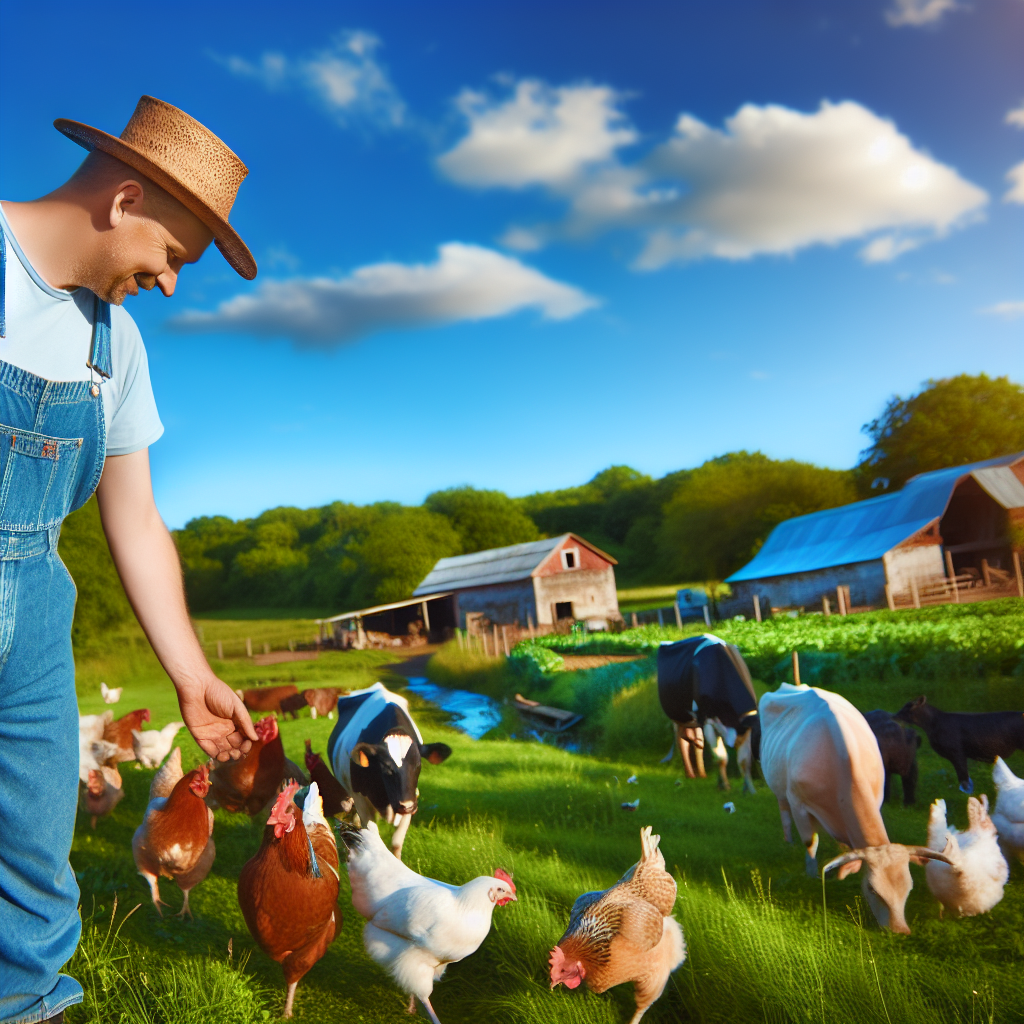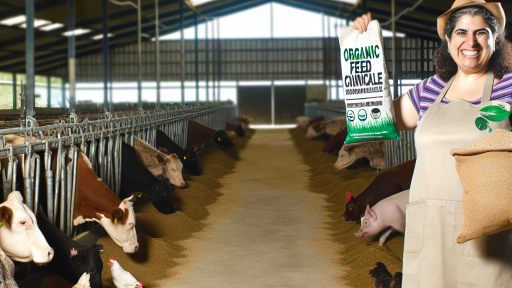Introduction to Ethical Animal Farming
Ethical animal farming involves raising animals with care and respect.
This practice prioritizes the welfare of animals in farming systems.
It is essential for ensuring sustainable agricultural practices.
Moreover, ethical farming supports humane treatment of livestock.
Farmers implement various principles to achieve these goals.
Definition of Ethical Animal Farming
Ethical animal farming refers to methods that promote animal welfare.
This includes providing appropriate living conditions for animals.
Farmers focus on health, behavior, and natural needs of the animals.
Additionally, regulations often shape ethical farming practices.
Importance of Ethical Animal Farming
Ethical animal farming contributes to better food quality.
Animals raised ethically often have lower stress levels.
This results in healthier livestock and higher quality products.
Furthermore, it enhances consumer trust in food sources.
By choosing ethical farming, consumers support sustainable ecosystems.
This approach promotes biodiversity and soil health.
Transform Your Agribusiness
Unlock your farm's potential with expert advice tailored to your needs. Get actionable steps that drive real results.
Get StartedUltimately, ethical farming benefits both animals and humans alike.
Principles of Ethical Farming
Animal Welfare Standards
Ethical farming prioritizes the well-being of animals on farms.
Farmers must ensure animals have proper living conditions.
Access to fresh air and natural light is essential.
Moreover, adequate space allows animals to express natural behaviors.
Organizations like the Humane Society offer guidelines for animal care.
These guidelines often include recommendations for nutritious diets.
Healthy eating contributes to the overall health of farm animals.
Additionally, regular veterinary care helps prevent illness.
Farmers should monitor animal health consistently.
Following ethics cultivates trust with consumers.
Assessing Living Conditions
Evaluating housing is vital in ethical farming practices.
Clean and safe living environments reduce stress for animals.
Farmers should provide bedding materials suitable for specific species.
This often includes straw, wood shavings, or sand.
Furthermore, avoiding overcrowding is crucial for animal welfare.
Enclosed spaces should allow animals to move freely.
Regular cleaning routines maintain hygiene on farms.
In turn, this minimizes the risk of disease spread.
Behavioral Enrichment
Ethical farming includes providing stimulation for animals.
Enrichment activities prevent boredom and promote mental health.
Farmers might introduce toys or puzzles to engage animals.
Access to pasture allows animals to forage naturally.
Social interactions also enhance animal well-being.
Showcase Your Farming Business
Publish your professional farming services profile on our blog for a one-time fee of $200 and reach a dedicated audience of farmers and agribusiness owners.
Publish Your ProfileSome species thrive in groups, while others prefer solitude.
Understanding these preferences is essential for proper care.
Commitment to Continuous Improvement
Farmers should seek ongoing education about animal welfare.
Staying updated on best practices ensures high standards.
This commitment involves participating in workshops and training.
Collaboration with veterinary professionals enhances knowledge.
Farmers benefit from networking with others in the ethical farming community.
Sharing experiences fosters innovation and improvement.
Ultimately, ethical farming strengthens the relationship between people and animals.
Choosing the Right Breeds for Ethical Production
Understanding Ethical Breeding Practices
Ethical breeding practices focus on animal welfare and sustainability.
Choosing the right breeds significantly impacts production outcomes.
For instance, it can affect growth rates and reproductive health.
Additionally, mindful selection promotes genetic diversity.
This diversity helps to build resilience in livestock populations.
Evaluating Breed Characteristics
Start by evaluating the characteristics of various breeds.
Some breeds excel in milk production, while others thrive as meat sources.
For example, Jersey cows are known for their rich milk output.
On the other hand, Angus cattle are prized for quality meat.
Consider the environmental adaptability of each breed as well.
Some breeds do better in harsher climates, enhancing farm success.
Considering Animal Welfare Standards
Select breeds that align with high animal welfare standards.
These breeds typically exhibit low stress and high wellbeing.
Moreover, focus on breeds with natural behaviors that suit pasture systems.
Pigs that root and forage are healthier and happier on farms.
Chickens that roam freely exhibit more natural behaviors and welfare.
Incorporating Local Breeds
Local breeds often adapt better to specific environmental conditions.
They usually require fewer resources and are more resilient.
Local breeds also contribute to preserving regional biodiversity.
For example, heritage chicken breeds offer unique flavors and hardiness.
Emphasizing local breeds fosters community ties and knowledge sharing.
Balancing Production Needs with Sustainability
Finding a balance between production and sustainability is essential.
Select breeds that provide good yields without compromising ecology.
Look for breeds that require less feed and water but deliver results.
By minimizing resource use, farms can enhance their sustainability.
Take time to research and analyze options thoroughly.
Uncover the Details: CSA Farming Best Practices for Modern Farmers
Feeding Practices: Organic and Sustainable Feed for Animals
Importance of Organic Feed
Organic feed plays a crucial role in ethical animal farming.
It ensures that animals grow without exposure to harmful chemicals.
Additionally, organic feed promotes better health among livestock.
Sourcing Sustainable Ingredients
Farmers must source sustainable ingredients for animal feed.
Showcase Your Farming Business
Publish your professional farming services profile on our blog for a one-time fee of $200 and reach a dedicated audience of farmers and agribusiness owners.
Publish Your ProfileThese ingredients should come from responsible and local suppliers.
Local sourcing reduces transportation emissions significantly.
Moreover, it supports the local economy and community.
Benefits of Sustainable Practices
Using sustainable feed results in healthier animal products.
Consumers benefit from higher nutritional value in the food.
Furthermore, animals consume a diet that aligns with their natural behavior.
Implementing Feeding Strategies
Farmers should implement innovative feeding strategies.
Mixed cropping can provide diverse feed options for livestock.
Regularly rotating feed types keeps the diet balanced.
Monitoring and Improving Feed Quality
Regular monitoring of feed quality is essential.
Farmers must test feed components for nutritional value.
This practice helps avoid deficiencies that can hinder growth.
Additionally, feedback from animal health professionals can improve strategies.
You Might Also Like: Sustainable Farming Equipment And Innovations
Housing and Space Requirements for Animal Comfort
Importance of Adequate Space
Animals require sufficient space to express natural behaviors.
Overcrowded conditions can lead to stress and health issues.
Moreover, proper spacing promotes better overall wellbeing.
It enhances social interactions among animals.
Additionally, it reduces competition over resources.
Designing Comfortable Housing
Effective housing design addresses species-specific needs.
For instance, chickens thrive in environments with perches.
Pigs benefit from solid, dry bedding for comfort.
Furthermore, cows require ample room for lying down and moving.
Ventilation and Temperature Control
Good ventilation is crucial for animal health.
It helps reduce humidity and ammonia levels in housing.
Moreover, temperature control prevents heat stress.
Animals should always have access to shade and fresh air.
Access to the Outdoors
Outdoor access is vital for many farm animals.
It allows them to engage in natural behaviors.
Additionally, grazing positively impacts animal nutrition.
Animals given outdoor space often show improved health markers.
Ensuring Safety and Security
Secure housing protects animals from predators and theft.
Moreover, housing should minimize risks of injury.
Regular inspections of structures help maintain safety.
Farmers must promptly address any potential hazards.
Incorporating Enrichment
Environmental enrichment significantly benefits farm animals.
It provides stimulation that encourages natural behaviors.
For example, adding toys or foraging materials enriches their environment.
Such practices help in reducing boredom and stress.
Uncover the Details: Promoting Local Agriculture via School Programs
Showcase Your Farming Business
Publish your professional farming services profile on our blog for a one-time fee of $200 and reach a dedicated audience of farmers and agribusiness owners.
Publish Your ProfileHealth Care and Veterinary Practices
Preventive Measures
Preventive measures play a crucial role in animal health care.
Farmers must implement regular health assessments for all animals.
Vaccinations protect animals from various diseases and infections.
Routine deworming ensures animals remain free from parasites.
Additionally, maintaining proper nutrition supports overall health.
Importance of Regular Check-ups
Regular veterinary check-ups are essential for early disease detection.
These visits help farmers monitor animal growth and health trends.
Veterinarians can provide tailored advice based on individual needs.
Consistent check-ups foster a proactive approach to animal welfare.
Establishing a Biosecurity Protocol
Implementing strong biosecurity measures protects animal populations.
Farmers should limit outside visitors to reduce disease exposure.
Additionally, cleaning and disinfecting equipment is vital.
These practices help in preventing the spread of pathogens.
Education and Training
Continuous education on animal care is necessary for farmers.
Veterinary workshops can enhance knowledge of animal health management.
Furthermore, farmers should stay informed about new health risks.
Employing trained staff boosts the overall efficiency of care.
Collaboration with Veterinarians
Building a strong relationship with local veterinarians is beneficial.
Veterinarians provide valuable insights into animal health trends.
They can assist in developing specific health protocols for farms.
Collaboration fosters an environment of shared knowledge and expertise.
Utilizing Technology in Animal Health Monitoring
Technology can significantly enhance health monitoring on farms.
Farmers can use digital tools to track animal health data.
Wearable devices help monitor vital signs and report abnormalities.
Such innovations facilitate timely veterinary interventions when needed.
Delve into the Subject: How CSAs Promote Sustainable Farming Practices

Mental Wellbeing of Farm Animals: Socialization and Enrichment
Importance of Socialization
Farm animals thrive when they have social interactions.
Socialization allows them to develop strong bonds with their peers.
Consequently, this reduces stress and promotes positive behavior.
Farmers can facilitate socialization by maintaining appropriate group sizes.
For instance, cows are social animals that need to be with companions.
Pigs also benefit from the company of their peers, enhancing their emotional health.
Benefits of Enrichment Activities
Enrichment activities play a vital role in mental wellbeing.
These activities stimulate animals mentally and physically.
Farmers can incorporate various enrichment techniques for animals.
For example, providing toys encourages natural behaviors in pigs.
Similarly, pecking devices can engage chickens and keep them entertained.
Creating an Enriching Environment
An enriching environment is essential for animal welfare.
Farmers should design facilities that mimic natural habitats.
Natural elements, such as trees or bushes, provide hiding spots for animals.
Showcase Your Farming Business
Publish your professional farming services profile on our blog for a one-time fee of $200 and reach a dedicated audience of farmers and agribusiness owners.
Publish Your ProfileThis setting allows them to express their natural instincts safely.
Additionally, adding varied textures and scents can enhance sensory stimulation.
Monitoring Animal Behavior
Regularly monitoring animal behavior is crucial for wellbeing.
Farmers must be aware of signs of stress or boredom.
Changes in behavior can signal underlying issues needing attention.
For instance, excessive vocalization may indicate anxiety in animals.
Therefore, proactive adjustments can help maintain a healthy environment.
Community and Educational Initiatives
Community support enhances ethical farming practices.
Farmers can collaborate with animal welfare organizations for guidance.
Educational programs can provide valuable resources on animal care.
Ultimately, spreading awareness promotes best practices in animal husbandry.
Ethical Slaughter Practices
Importance of Humane Treatment
Humane treatment of animals is vital in ethical farming.
It fosters a respectful and compassionate relationship with livestock.
Additionally, it enhances the quality of life for farm animals.
Furthermore, humane practices lead to better meat quality.
Methods of Ethical Slaughter
Several methods ensure humane slaughter practices.
The first method is stunning, which renders the animal unconscious.
This method reduces suffering significantly.
Electric stunning offers quick and effective results.
Another method involves utilizing captive bolt pistols.
This approach ensures a swift and painless death.
Compliance with Regulations
Compliance with animal welfare regulations is essential.
Farmers must adhere to guidelines set by organizations like the USDA.
Regular inspections help maintain humane practices on farms.
Post-Slaughter Processing
Post-slaughter processes also require ethical considerations.
Proper handling ensures meat remains safe and clean.
Moreover, avoiding waste in processing promotes sustainability.
Consumer Awareness
Consumers play a significant role in promoting ethical practices.
Choosing meat from certified humane farms encourages good practices.
Educating others about humane treatment can drive further change.
Certifications and Labels: Understanding Ethical Farming Standards
The Importance of Certifications
Certifications provide assurance to consumers about farming practices.
They help consumers make informed choices about the food they purchase.
Importantly, these labels promote accountability in farming.
Moreover, they encourage farmers to adopt ethical practices.
Common Certifications in Ethical Farming
Several certifications exist for ethical farming standards.
- Certified Humane
- Animal Welfare Approved
- USDA Organic
Each of these certifications ensures specific animal welfare standards.
They also guarantee the absence of harmful practices in farming.
Understanding Labels
Labels provide essential information about the treatment of animals.
It is crucial to read labels before making purchases.
Look for terms like “grass-fed,” “free-range,” or “pasture-raised.”
Showcase Your Farming Business
Publish your professional farming services profile on our blog for a one-time fee of $200 and reach a dedicated audience of farmers and agribusiness owners.
Publish Your ProfileThese labels indicate the conditions in which animals are raised.
The Role of Consumers
Consumers play a significant role in promoting ethical farming.
By choosing certified products, they support humane practices.
Furthermore, their choices can influence market trends.
This encourages farmers to improve their practices over time.
Challenges in Certification
Despite its benefits, obtaining certification can be challenging for farmers.
The process often requires significant time and financial investment.
Some farmers may find the requirements overwhelming.
Additionally, the variety of certifications can confuse consumers.
Future of Ethical Farming Certifications
As demand for ethical products rises, certifications will evolve.
New standards may emerge to address changing consumer concerns.
Technology may also play a role in improving transparency.
Ultimately, ongoing dialogue between farmers, consumers, and certifiers is essential.
Case Studies: Successful Ethical Farms and Their Practices
Sunrise Farms
Sunrise Farms demonstrates exemplary ethical farming methods.
Located in Oregon, this farm specializes in pasture-raised poultry.
They prioritize animal welfare and environmental sustainability.
Furthermore, they utilize a rotational grazing system.
This system allows the land to recover naturally.
The hens enjoy a spacious outdoor environment.
As a result, they produce high-quality, nutritious eggs.
Greenways Organic Farm
Greenways Organic Farm represents another successful case study.
This farm operates in New York with a focus on organic crops and livestock.
They employ holistic land management techniques.
This approach enhances soil health and biodiversity.
In addition, the farm offers farm-to-table experiences.
Visitors can learn about ethical farming first-hand.
This transparency fosters trust and loyalty in consumers.
Harmony Acres Sanctuary
Harmony Acres Sanctuary focuses on rescue and rehabilitation.
It provides shelter to animals from abusive conditions.
Located in Texas, this sanctuary promotes compassion and education.
They also host workshops on ethical animal care.
These workshops emphasize empathy in animal husbandry.
Visitors are encouraged to volunteer and participate actively.
Moreover, they practice regenerative agriculture techniques.
These practices facilitate ecosystem restoration.
Blue Sky Ranch
Blue Sky Ranch operates in California and emphasizes transparency.
The ranch utilizes open pastures for livestock grazing.
They breed heritage livestock breeds that thrive outdoors.
Additionally, they maintain a strong community connection.
Blue Sky Ranch regularly hosts local farmers’ markets.
Showcase Your Farming Business
Publish your professional farming services profile on our blog for a one-time fee of $200 and reach a dedicated audience of farmers and agribusiness owners.
Publish Your ProfileThis encourages collaboration among small-scale farmers.
Ultimately, this approach creates a sustainable food network.
Luna Creek Farm
Luna Creek Farm prioritizes integrated pest management.
This method reduces the need for chemical pesticides.
They employ beneficial insects for natural pest control.
Furthermore, they practice crop rotation to maintain soil health.
Located in Vermont, they produce a variety of fruits and vegetables.
Community-supported agriculture (CSA) programs are central here.
Members receive fresh produce directly from the farm.
This creates a strong relationship between consumers and producers.




